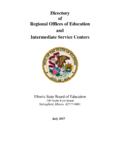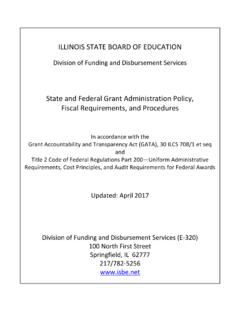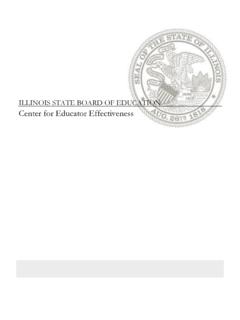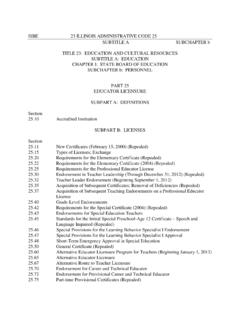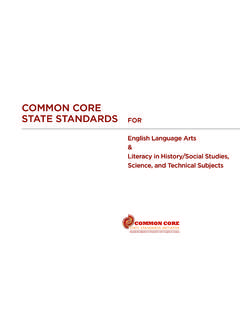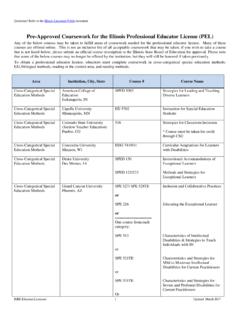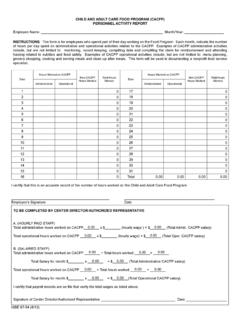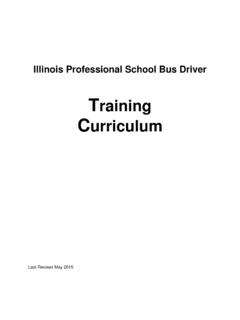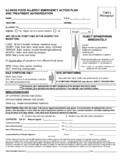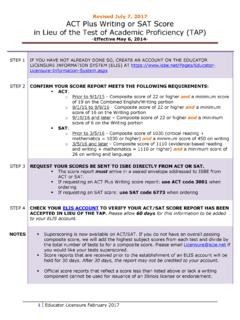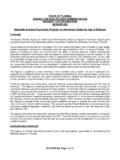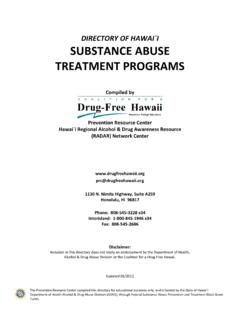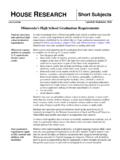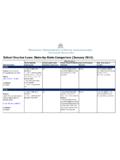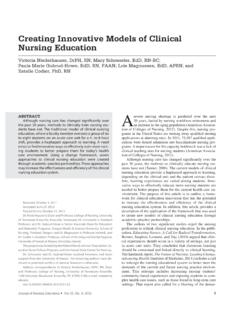Transcription of Chapter 6: Individualized Education Programs (IEPs)
1 Chapter 6: Individualized Education Programs (IEPs)In this Chapter you will: learn the parts of an IEP learn who is on an IEP team discover tips and things to remember when working on the IEP understand the additional requirements the team must con-sider when writing an IEP for a student who has a disability on the autism spectrum learn that changes can be made to an IEP without a meeting know what prior written notice is and learn when schools are required to provide it learn what happens if a parent revokes consent to provide special Education to a student3334 Educational Rights and Responsibilities: Understanding Special Education in IllinoisWhat is an IEP?What is an IEP?Once it is determined that a student meets the criteria to receive special Education and related services, an Individ-ualized Education Program (IEP) will be developed.
2 An IEP is a written statement of the educational program de-signed to meet the student s needs and is developed by a team. The IEP includes a detailed description of what will be done to give the student the extra help needed. The IEP will change based on the student s needs it is like a road map showing where the student is and where he or she is is on the IEP team?The following individuals are required to attend all IEP meetings: Parent(s) - Parents are equal participants. Student The student may attend and participate if the parent(s) decide he/she should be present. General Education Teacher - The IEP team must in-clude a general Education teacher who has knowledge of the curriculum and may be responsible for imple-menting the IEP, if the child is, or may be, participating in the general Education environment. Special Education Teacher - There must be a special Education teacher on the IEP team who is responsible for implementing the IEP.
3 School Administrator - This person must know about the general Education curriculum and be able to ensure that the IEP is implemented and has the authority to commit resources. Evaluation Personnel - This person must be someone who can explain evaluation and/or test results. Others with knowledge or special expertise about the student - The parents or the school may bring oth-Important ReminderRequired members may be excused from part or all of the meeting only if you and the school agree in writing. If you agree to excuse a mem-ber, that person must give written input to you and the team before the State board of Education , June 2009 Chapter 6: Individualized Education Programs (IEPs)35er people to the IEP meeting such as community ser-vice providers, advocates, lawyers, a friend for support etc. The law says these people must have some knowl-edge or special expertise about your child, but the de-termination of whether the person has special knowl-edge is up to the Timelines to Remember The IEP meeting must occur within 60 school days from the date of the referral.
4 The IEP meeting must occur within 30 days after the team determines that the student is eligible to receive special Education and/or related services. The IEP must be reviewed at least once a year; how-ever, an IEP meeting can be convened at any time to discuss changes or revisions. Parents must be informed of their child s progress on IEP goals at least as often as parents of nondis-abled an IEP Includes Present levels of academic and functional performance Annual goals Measurements of progress and how progress will be shared What special Education and related services will be provided how often they will be provided (frequency) how long they will be provided (duration) where they will be provided (location) who will provide the services How the child will access the general Education cur-Important Reminder Date of referral means the date of written pa-rental consent for Rights and Responsibilities.
5 Understanding Special Education in IllinoisSpecifics about IEP Componentsriculum The modifications or supports that will be provided in the classroom to and from school in the school building for school functions (field trips, sports, prom, play-ground, etc.) Assessment information (which assessments will beadministered, any accommodations to the assessments) A description of any assistive technology, includingtraining, the student or staff may need Special training or support that the student, the parentand school staff need in order to ensure the student isprovided FAPE A discussion of whether the student needs addition-al help and support when school is not in session (Ex-tended School Year Services [ESY]), and Beginning when the child turns 14 , appropriate tran-sition services, including postsecondary services andsupports. The placement of the child that will implement the IEP.
6 (For more information on the proper factors to considerin the placement decision, please see Chapter 7, LeastRestrictive Environment. )Specifics about IEP ComponentsPresent levels of academic and functional performanceThese describe how the student is doing in different areas and how the student uses what he/she learned throughout the day. This part of the IEP should describe how the stu-dent s disability affects his or her partipation in the gen-eral Education curriculum and how the student performs 37 illinois State board of Education , June 2009 Chapter 6: Individualized Education Programs (IEPs)in academic and nonacademic goalsA goal is something that can be obtained within a school year. Data should form the basis for instruction and the goals should be written to allow access to the general cur-riculum and other activities during or after school.
7 Goals must be measurable, identify who will be responsible for working on them, and identify how progress will be re-ported to parents. Benchmarks or short-term objectivesShort-term objectives are the steps toward meeting the goals. A short term objective is something that can be at-tained within a reporting or grading period. Each bench-mark or short-term objective should list the steps neces-sary to achieve the goal by the end of the school toward goalsThe IEP should include information about how the school will measure the student s progress and when reports to the parents will be issued. The measurement should be clear enough so that parents can understand whether their child is being successful or Education and related servicesThese services and supports assist the student to advance toward the annual goals, progress in the general curricu-lum, participate in extracurricular and nonacademic activ-ities, be educated and participate with all children.
8 The IEP should include any additional training or support needed by the parents, educators, and paraprofessionals. Participation in the general curriculumThe IEP must explain how the child s disability affects 38 Educational Rights and Responsibilities: Understanding Special Education in IllinoisSpecifics about IEP Componentshis/her participation in the general Education setting and other school activities. If a student is removed from any part of the general curriculum, a statement explaining the reason(s) why must be part of the IEP. Adaptations or modifications can be used to support student success in the classroom. Statewide assessmentAll children with disabilities must be part of state and dis-trictwide assessments with appropriate accommodations, including English language proficiency, where appropri-ate. The IEP team decides whether the student should be given state and/or district assessments, with or without ac-commodations; or if the student should take the alternate assessment.
9 If the IEP team decides that the child should take the Illi-nois Alternate Assessment ( IAA ), the IEP must include: An explanation of why the child cannot take the regu-lar test The participation criteria has been met by a Yes re-sponse to the two (2) statements in the IAA Participa-tion Guidelines (see Appendix D) A statement explaining how the student will be as-sessedFrequency, location, and duration of servicesThis is the what, when, where, and for how long: part of the IEP. Each of the services the student needs should be written into the IEP and indicate: 1) how long or how often each session will last (the number of minutes); 2) where the services will be provided ( , general Education class-room, a resource room, or another setting such as the com-munity); and 3) when the services will begin and a LookA wide range of information on the illinois Alternate As-sessment is available on the ISBE website at: State board of Education , June 2009 Chapter 6: Individualized Education Programs (IEPs)TransitionFor students who will reach the age of 14 during the school year, the IEP must document a statement of transi-tion service needs that focuses on the student s course of study and goals to address those needs.
10 Transition services are a coordinated set of activities that focuses on improv-ing academic and skill achievement to prepare for life after school. The goals should include the needs for: training, Education , employment, and independent living, where appropriate. Transition services may include academic in-struction, related services, postsecondary Education , vo-cational training, supported employment, community ex-periences, daily living skills, and work evaluation. Tran-sition plans must include the student s strengths, prefer-ences, and interests. The student must be invited to the IEP meeting. In preparing for the meeting, parents should: Think about what the child needs to learn to help thembe successful after graduation Help students explore work and career options whilestill in high school Decide what skills the young person needs to live andwork in the community after high school Make connections with Education and training pro-grams, colleges, agencies, and support services Assist in the selection of classes and services that mighthelp the child be successful in his/her adult life Learn what agencies provide services to adults withdisabilities in the community and invite them to theIEP meeting.
